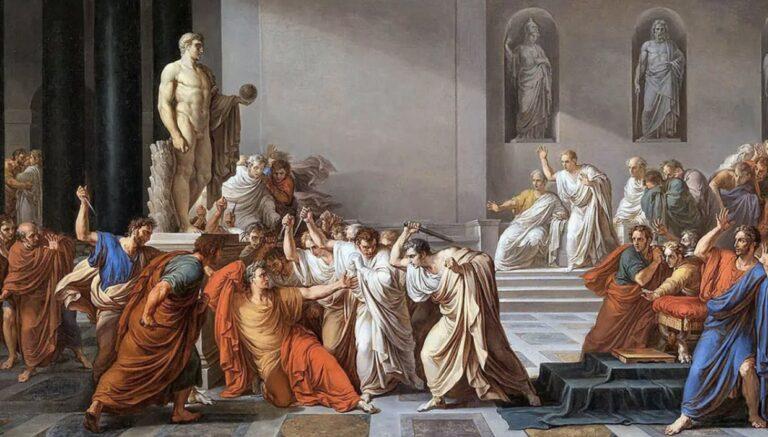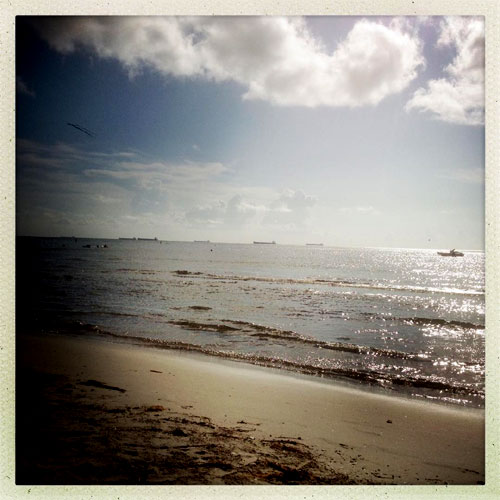988: Traditional date of the founding of Dublin, Ireland.
1040: Lady Godiva makes her famous ride through Coventry to protest an onerous tax levied by her husband. He relents.
1099: The First Crusade– Low on supplies, and finding themselves encamped on arid ground after they failed to initially breach the fortified walls of Jerusalem, the 15,000 men of the First Crusade respond to a vision by the priest Peter Desiderius to purify themselves by a three day fast, and then make a pious demonstration of marching barefoot around the city, mimicking the Hebrews’ actions at Jericho. This day saw both the completion of the fast and the demonstration around the city, and stimulated a public rapprochement between bickering factions in the Crusader army. One week later, the final assault on Jerusalem will begin.
1189: Richard the Lionhearted is crowned King of England. The son of French King Henry II and Eleanor of Aquitaine, he also ruled as Duke of Normandy, Duke of Aquitaine, Duke of Gascony, Lord of Ireland, Lord of Cyprus, Count of Anjou, Count of Maine, Count of Nantes, and Overlord of Brittany. You will note that the vast majority of these realms are in France: Richard (in this context pronounced Ree-shard’ (with your eyebrows slightly arched and a Gauloises dangling from your lips)) spent only six months or so on the Auld Sod, complaining that it was “always rainy.” But Britons remained proud of his military prowess and continued to hold him up as the embodiment of British virtues, even as they were perpetually taxed to pay for not only his crusades, but also his literal King’s Ransom, which finally freed him from imprisonment in Austria on return from the Holy Lands.
1415: Death of Bohemian religious reformer Jan Hus (b.1369), burned at the stake for heresy. An early precursor to the great Protestant Reformation that began a century later, Hus was deeply influenced by the teachings of Briton John Wycliffe, and brought back to Bohemia new religious thinking that shocked the established church with its emphasis on the individual over the institution in salvation. He played a central role during the papal schism between Rome and Avignon. He wrote against the European papal crusades and the sales of indulgences. He was excommunicated by Pope Alexander V in 1409, but the Bohemian government took his side against the pope. Tensions continued over the next several years, until Prince Sigsmund of Hungary convened the Council of Constance to settle the dispute once for all. Despite promise of safe passage, Hus was arrested and imprisoned. During his trial he was read 39 charges against him, all derived from excerpts from his and Wycliffe’s writings, but framed in the context of their threat to the authority of both church and state. Repeatedly asked to recant, he refused, denying that anything written was contrary to the Bible. Hus’ fate thus sealed, he was on this day taken to the cathedral in Constance, dressed in priestly vestments. He was repeatedly asked to recant, and with each denial a part of the vestment was torn from his person. His degradation continued to the point of being shorn and stripped, then tied to the stake with a massive pile of straw heaped around him. At the final request for recantation, he declined with the words, “God is my witness that the things charged against me I never preached. In the same truth of the Gospel which I have written, taught, and preached, drawing upon the sayings and positions of the holy doctors, I am ready to die today.” After his death, his bones were dug up and re-burned, and his ashes scattered at sea.
1535: Death of Sir Thomas More (b.1478), executed for treason against King Henry VIII. The brilliant humanist philosopher and the king’s recent Lord High Chancellor refused to countenance Henry’s annulment from Catherine of Aragon, and denied the king’s recently assumed role as head of the Church in England, writing, “No temporal man may be the head of the spirituality.” More’s strong defense of papal authority in matters spiritual put him deeply at odds with the mercurial king and led to his removal from office and subsequent trial and execution. In a nominal commutation of his sentence, Henry averred that More’s earlier status permitted he be beheaded rather than hanged, drawn and quartered as the punishment for treason. When More mounted the execution scaffold he turned to the sheriff: “I pray you, Mr Lieutenant, seem me safe up; and for my coming down, I can shift for myself… I die the king’s good servant, but God’s first.” His body was buried in an unmarked grave in the Tower of London, his head fixed on a pike over London Bridge for a month after the execution, then rescued by his daughter and buried in the Roper family vault in Canterbury. More’s death was (and is) widely seen as a travesty of justice. Winston Churchill wrote, “The resistance of More and Fisher to the royal supremacy in Church government was a noble and historic stand. They realized the defects of the existing Catholic system, but they hated and feared the aggressive nationalism which was destroying the unity of Christendom…Henry VIII with cruel axe decapitated not only a wise and gifted counselor, but a system, which…had for long furnished mankind with its brightest dreams.” More was beatified by the Catholic Church in 1886 and was canonized, along with John Fisher, in 1935. He is remembered in the literary world as A Man for All Seasons.
1775: Nearly four months after the breakout of open conflict, and a day after George Washington took command of what passed for a Continental Army, the Second Continental Congress approves the “Olive Branch Petition,” appealing to King George that the American colonies are not really seeking independence, and recommending that the Crown and colonies negotiate tax and trade policies in order to avoid war. John Adams is against it, reasoning that war is essentially inevitable, but the petition couldn’t hurt, so he didn’t block its passage.
1778: As evidence of his support- heavily lobbied by John Adams and Thomas Jefferson- of the newly declared United States of America, Louis XVI of France declares war on the United Kingdom. The war costs him big money, which he finances through heavy borrowing. The financial strain plays directly into the crisis that caused him to convene the Estates General in 1789.
1789: The French National Assembly, which on the 17th of June formed itself out of an uneasy alliance between the 3rd and 2nd Estates of the Estates Generale, almost immediately became embroiled with both the Crown and the 1st Estate over its legitimate authority. Banned from the Estates venue, on the 20th of June it met on a tennis court and took The Tennis Court Oath, which committed the Assembly not to adjourn until it had created a new national constitution. By this day, the Crown had moderated its demands on the group, and they in turn re-designated themselves the National Constituent Assembly, and assumed unto themselves sole legislative authority, an assertion not yet universally agreed upon. It did, however, provide a viable venue for the continued transformation- to full revolution– of the French government.
1798: The Quasi-War with France– After four years of increasing tensions between the United States and the revolutionary French Republic, including repeated capture of American merchant ships by French privateers, Congress on this day repeals all treaties with France. This includes cancelling our Revolutionary War debt to France, justified on the basis that the money was owed to the Crown and not the Republic. The action infuriated the French government, who increased its issue of Letters of Marque in order to continue harassing American shipping. With its entire navy in layup after the war, the American coastline is completely naked to attacks. President Adams re-activated 25 ships, who go on to distinguish themselves by capturing 22 privateers and deterring hundreds of attacks on American shipping. The conflict lasts nearly two years, until Napoleon Bonaparte takes control of the French Directory and focuses French attentions elsewhere.
1839: Birth of John D. Rockefeller (d.1937): Cleveland native, oil man, industrial titan, and philanthropist.
1846: U.S. troops occupy Monterrey and Yerba Buena (San Francisco), beginning the American conquest of California.
1846: Congress authorizes the retrocession to Virginia of District of Columbia lands south of the Potomac River. So the Pentagon is, in reality, not in DC. Something along these lines, by the way, would be a viable solution to the problem of “representation” for District residents. We could call their home district, say, “Maryland” as a way for them to vote for more taxes on themselves.
1853: Commodore Matthew Perry, with a United States Navy fleet dubbed the “Black Ships” by the Japanese, steams into Tokyo Bay to begin negotiations to open trade relations between the United States and Japan.
1856: Birth of Nikola Tesla (d.1943), Serbian-American inventor whose work with electricity and magnetism was well ahead of his time. He compounded the aura of his foreign background with a certain mysticism and P.T Barnum-like hucksterism that isolated him and his work from the mainstream scientists of the early twentieth century.
1868: Final ratification of the 14th Amendment, guaranteeing full citizenship to former slaves.
1896: Rising to the podium of the Democratic National Convention in Chicago, former Congressman William Jennings Bryan delivers the speech: The Cross of Gold, an electrifying comparison of the lives of working men and farmers against the lives of elite city dwellers and market speculators. The comparison leveled the ongoing debate on monetary policy, which had been tightly regulated at a 16:1 ratio of silver to gold coinage, with gold being the standard of exchange between all the major economies, but the tight standard leaving the common man without the means to provide for his family, let alone expand his own farm or business. Bryan forcefully advocated for free silver to break the cities’ stranglehold rural America, concluding with the words, “You shall not press down upon the brow of labor this crown of thorns; you shall not crucify mankind upon a cross of gold.” Standing at the podium with arms outstretched, the convention delegates sat in stunned silence for what seemed like an eternity, remaining silent as he stepped off the platform and returned to his seat. The convention then suddenly erupted into chaos and Bryan was hoisted to the shoulders of the crowd and paraded around the convention floor. The next day’s voting reflected the delegates’ continuing enthusiasm, and Bryan swept the Democrat’s nomination for president, eventually losing to William McKinley in November.
1863: The United States authorizes its first military draft to fill the ranks of the Union army. Exemptions and substitutions may be purchased for $300. A lucrative black market follows.
1865: At the Old Arsenal Penitentiary (now inside Fort McNair) in Washington, four conspirators convicted in the assassination of Abraham Lincoln are hanged by the neck until dead, three months after the President’s shooting by John Wilkes Booth.
1917: Under the leadership of Colonel T.E. Lawrence, troops from the Arab Legion capture the Ottoman port of Aqaba as part of the British-inspired Arab uprising against the Turks, whose empire was regularly referred to during the Great War as “The Sick Man of Europe.” Given Turkey’s alignment with the Central Powers, both Britain and France looked eagerly to the post-war dismemberment of the Ottoman Empire and their eventual participation in the spoils.
1925: Opening day of the ACLU-initiated trial against young biology teacher John T. Scopes, in Dayton, Tennessee. Media circus to follow. The case was sensationalized primarily because of the presence of the two most famous lawyers in the country, three-time presidential candidate William Jennings Bryant for the prosecution, and Clarence Darrow for Scopes. The climax came when the two lawyers agreed to cross-examine each other on the issues surrounding the teaching of evolution.
1930: Under the guidance of industrialist Henry Kaiser, construction begins on Boulder Dam in southern Nevada.
1937: That lunchmeat SPAM is introduced by Hormel meat packing company.
1940: First major Luftwaffe assault in what would become known as the Battle of Britain
1941: German troops reach the shores of the Dnieper River, deep in the Soviet Union.
1943: First day of the Battle of Kursk, which will end up becoming the largest tank battle in history.
1943: Opening guns of Operation HUSKEY, the Allied invasion of Sicily. During this campaign Lieutenant General George S. Patton cements his reputation as “Old Blood and Guts” as he sweeps wide of his assigned lanes and captures not only Palermo at the western end of the island, but beats British Field Marshall Montgomery to Messina in the east.
1944: After three weeks of intense fighting, Saipan Island in the Marinas is declared taken. The final days of the assault included the Japanese staging a suicidal Bonzai charge that overwhelmed the combined Army and Marines units in their path, but resulted in over 4,500 Japanese deaths, many of whom were already-wounded personnel dragooned into the desperate charge. Saipan was also where Japanese civilian suicides were first ordered en masse. The island became a major US Army Air Corps bomber base for attacks on the Japanese homeland.
1946: The bikini “swimsuit” is reintroduced to the fashion world in Paris. French engineer Louis Reard and fashion designer Jacques Heim combine their talents for this event. Reard took credit for the name, likening the reaction to the swimsuit to the atomic explosions being tested on the Bikini atoll in the western Pacific. Interestingly, the style is not a new idea as found on an ancient Roman mosaic of “beach volleyball”.
1947:The AK-47 rifle goes into production in the Soviet Union. It remains the most widely produced and distributed firearm in the world.
1950: The 500 American soldiers Task Force Smith become the first U.S. troops to directly engage with 5,000 troops of the onrushing North Korean army at the Battle of Osan, just south of Seoul. In a textbook example of how the Army no longer* does business, the commander of the battalion was issued the following orders:
“When you get to Pusan, head for Taejon. We want to stop the North Koreans as far from Pusan as we can. Block the main road as far north as possible. Make contact with General Church. If you can’t find him, go to Taejon and beyond if you can. Sorry I can’t give you more information—that’s all I’ve got. Good luck, and God bless you and your men!” –Major General William F. Dean’s orders to Colonel Smith. They successfully blocked the Norks for over three hours before being overrun, buying critical time for the continuing U.S. troop debarkation at Pusan.
1951: The city of Paris celebrates its 2000th birthday.
1960: Two months after being shot down on a U-2 reconnaissance mission over Russia, the Soviet Union formally charges Francis Gary Powers with espionage. He is convicted in August and spends two years in prison before being part of a prisoner exchange with the U.S. for Soviet spy Rudolf Abel.
1962: The United States conducts the STARFISH high altitude nuclear test program. This burst was one of five conducted in outer space during the FISHBOWL series of tests. STARFISH was a 1.4 megaton W49 warhead carried by a Thor rocket to an apogee of 680 miles. The Mk.4 re-entry vehicle was detonated at 250 miles and produced an electromagnetic pulse that forced virtually all of the instrumentation off the scale, in addition to creating an orbital radiation belt and an aurora visible for hours after the burst.
1962: Launch of TELSTAR, the world’s first active, direct-relay communications.
1985:French intelligence agents (DGSE) bomb and sink the Greenpeace vessel Rainbow Warrior in Auckland harbor, New Zealand.
1996: Birth of Dolly the sheep, the world’s first cloned mammal.




I must say that this entire "conversation" reminds me of feral junkyard cats hissing and spitting at each other. "Turds"?…
Point proven! God help us there's no hope!
Peter, you've been playing with your turds since you were two. Please stop.
People like you are the reason the country is so divided. You can't have a constructive conversation. You quickly turn…
So let's be clear on the subject....you agree it would be reasonable to have bleach injections?? And you're calling me…